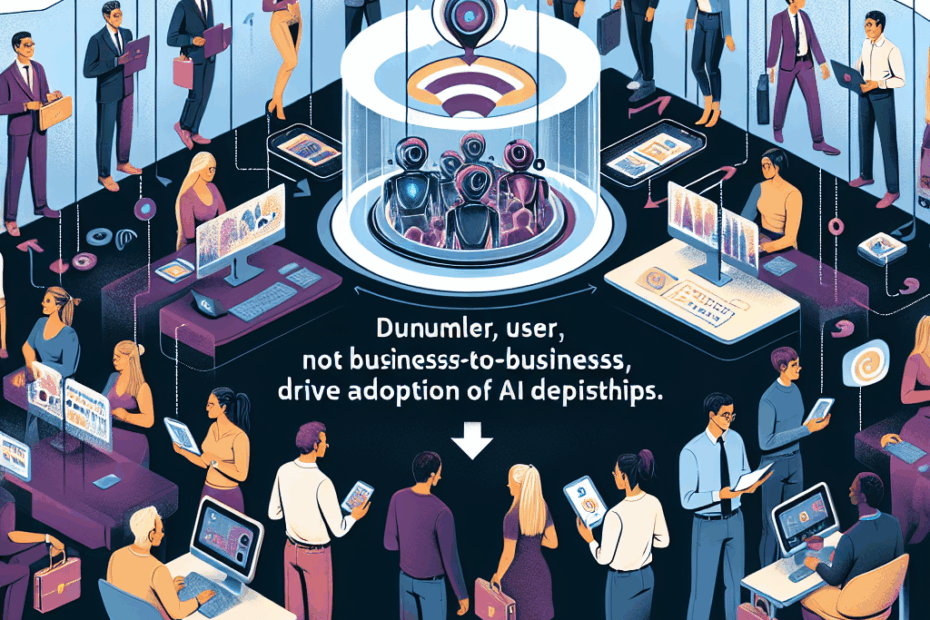“`html
AI: Not Just for Businesses Anymore?
Hey everyone, John here, back with another look at the ever-changing world of AI! Today, we’re diving into an interesting idea: is AI becoming more of a “consumer” thing rather than something just for businesses? According to OpenAI, the company behind ChatGPT, that might just be the case.
The “Back Door” Approach to AI in Business
The article we’re looking at suggests that many AI projects within companies are failing. Think of it like this: businesses might be trying to force-fit AI into their operations, but it’s not quite working. So, what’s the alternative?
OpenAI believes that AI will sneak into companies through the “back door” – meaning individual employees will start using AI tools on their own, without the official blessing of their IT departments. It’s like bringing your own lunch to work instead of eating in the company cafeteria. Sounds familiar, right?
Lila: John, what does “IT departments” mean?
John: Great question, Lila! IT departments are the folks in charge of all the computers, software, and tech stuff at a company. They’re like the guardians of the digital realm, making sure everything runs smoothly and securely.
Why Consumers Might Lead the AI Revolution
So, why might consumers be the ones to drive AI adoption in the workplace? Here are a few possibilities:
- Ease of Use: AI tools like ChatGPT are becoming incredibly user-friendly. You don’t need to be a tech expert to use them.
- Personal Productivity: People are using AI to write emails, summarize documents, generate ideas, and generally be more efficient.
- Bottom-Up Adoption: When employees find AI tools that genuinely help them, they’ll naturally start using them, and then maybe even suggest them to the company.
Think about it: If you find an app that saves you hours of work each week, you’re going to keep using it, right? And you might even tell your coworkers about it.
The Challenge for IT Departments
But even if AI comes in through the “back door,” IT departments will still have to deal with it. This presents some challenges:
- Security Risks: Employees using unauthorized AI tools could expose company data to security threats. Imagine someone accidentally sharing sensitive information with a public AI service!
- Compliance Issues: Some AI tools might not comply with industry regulations or company policies.
- Integration Problems: Integrating employee-used AI tools with existing company systems could be a headache.
Lila: “Compliance”? What’s that?
John: “Compliance” means following the rules and regulations that a company needs to adhere to. For example, if a company handles personal data, there are rules about how they need to protect that data. Compliance is like making sure everyone is playing by the rules of the game.
The Future of AI in the Workplace
So, what does all this mean for the future of AI in the workplace? It suggests that companies need to be proactive about AI adoption. Instead of trying to force AI on their employees, they should:
- Encourage experimentation: Allow employees to explore different AI tools and see what works for them.
- Provide training and support: Help employees understand how to use AI tools safely and effectively.
- Develop clear AI policies: Establish guidelines for AI usage to address security, compliance, and ethical concerns.
In other words, companies need to embrace AI, but in a controlled and responsible way.
A Shift in Perspective
This article highlights an important shift in how we think about AI. It’s not just a tool for big businesses anymore; it’s becoming a tool for everyone. And that means companies need to adapt their strategies to reflect this new reality.
Lila: So, instead of the company telling us what AI to use, we might be telling the company what AI we want to use?
John: Exactly, Lila! It’s a much more democratic approach.
John’s and Lila’s Thoughts
For me, this article underscores the importance of adaptability. The tech landscape is constantly evolving, and businesses need to be agile to stay ahead. It’s not about resisting change, but about embracing it in a smart way.
Lila: I think it’s exciting that AI is becoming more accessible to everyone! It makes me wonder what other cool things will be possible in the future.
This article is based on the following original source, summarized from the author’s perspective:
AI ain’t B2B if OpenAI is to be believed
“`
